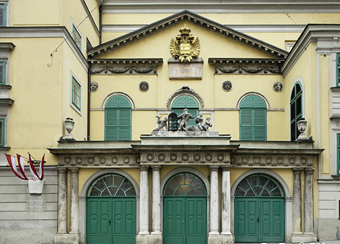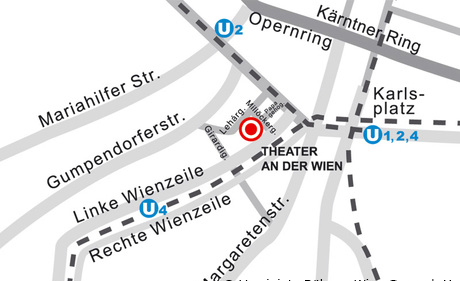Alcina
December 2024 | ||||||
|---|---|---|---|---|---|---|
Mo | Tu | We | Th | Fr | Sa | Su |
Dramma per musica in three acts
Libretto after Antonio Fanzaglia
An opera about magic with magical music: Alcina rules over an island full of men. But it is only through sorcery that she can keep her lovers by her side. When the young Bradamante lands on the island in search of her beloved Ruggiero, Alcina’s love spells come under threat from true love. George Frideric Handel’s Alcina is one of the highlights of his operatic oeuvre. Composed in 1735, its melodies constitute an embarrassment of riches which constantly reveal new sides to the characters. In particular, the arias sung by Alcina as she sees her power challenged are among the most outstanding psychological studies that Handel ever created. The concert performance with the ensemble Il Pomo d’Oro brings together a superb ensemble at the MusikTheater an der Wien led by Elsa Dreisig as Alcina and Sandrine Piau as Morgana.
Concert performance in Italian with German surtitles
Introduction to the work 30 minutes before curtain-up
Synopsis
Prologue
The background of the opera comes from the poem Orlando Furioso. The heroic knight Ruggiero is destined to a short but glorious life, and a benevolent magician is always whisking him away from the arms of his fiancée, Bradamante. Bradamante is not the type to put up with the constant disappearance of her lover, and she spends vast portions of the poem in full armor chasing after him. Just before the opera begins she has rescued him from an enchanted castle, only to have her flying horse (a hippogriff) take a fancy to Ruggiero and fly off with him. Ruggiero and the hippogriff land on an island in the middle of the ocean. As the hippogriff begins to eat the leaves of a myrtle bush, Ruggiero is startled to hear the bush begin to speak. The bush reveals that it was once a living soul named Sir Astolfo, and the island belongs to the sister sorceresses Alcina and Morgana. The beautiful Alcina seduces every knight that lands on her isle, but soon tires of her lovers and changes them into stones, animals, plants, or anything that strikes her fancy. Despite Astolfo's warning, Ruggiero strides off to meet this sorceress – and falls under her spell.
Act 1
Bradamante, again searching for her lover, arrives on Alcina's island with Ruggiero's former tutor, Melisso. Dressed in armor, Bradamante looks like a young man and goes by the name of her own brother, Ricciardo. She and Melisso possess a magic ring which enables the wearer to see through illusion, which they plan to use to break Alcina's spells and release her captives.
The first person they meet is the sorceress Morgana. Barely human and with no understanding of true love, she immediately abandons her own lover Oronte for the handsome 'Ricciardo.' Morgana conveys the visitors to Alcina's court, where Bradamante is dismayed to discover that Ruggiero is besotted with Alcina and in a state of complete amnesia about his previous life. Also at Alcina's court is a boy, Oberto, who is looking for his father, Astolfo, who was last seen heading toward this island. Bradamante guesses that Astolfo is now transformed into something, but she holds her peace and concerns herself with Ruggiero. Bradamante and Melisso rebuke Ruggiero for his desertion, but he can't think of anything except Alcina.
Meanwhile, Oronte discovers that Morgana has fallen in love with 'Ricciardo,' and challenges 'him' to a duel. Morgana stops the fight, but Oronte is in a foul mood and takes it out on Ruggiero. He tells the young man exactly how Alcina treats her former lovers and adds that, as far as he can tell, Alcina has fallen in love with the newcomer, Ricciardo (Semplicetto! A donna credi?Nr. 12). Ruggiero is horrified and overwhelms Alcina with his jealous fury. Things get even worse when 'Ricciardo' enters and pretends to admire Alcina. Alcina calms Ruggiero (Sì, son quella Nr. 13), but Bradamante is so upset at seeing her fiancé wooed before her very eyes that she reveals her true identity to Ruggiero (La bocca vaga, quell'occhio nero Nr. 14). Melisso hastily contradicts her and Ruggiero becomes very confused.
Alcina tells Morgana that she plans to turn Ricciardo into an animal, just to show Ruggiero how much she really loves him. Morgana begs Ricciardo to escape the island and Alcina's clutches, but 'he' says he'd rather stay, as he loves another. Morgana believes that this other person is herself, and the act ends with Morgana's aria "Tornami a vagheggiar". (In some productions, this aria is sung by Alcina.)
Act 2
Melisso recalls Ruggiero to reason and duty by letting him wear the magic ring: under its influence, Ruggiero sees the island as it really is—a desert, peopled with monsters. Appalled, he realizes he must leave, and sings the famous aria "Verdi prati" ("Green meadows") where he admits that even though he knows the island and Alcina are mere illusion, their beauty will haunt him for the rest of his life.
Melisso warns Ruggiero that he cannot just leave; Alcina still wields immense power, and he should cover his escape by telling her that he wishes to go hunting. Ruggiero agrees, but, thoroughly bewildered by the magic and illusion surrounding him, he refuses to believe his eyes when he at last sees Bradamante as herself, believing that she may be another of Alcina's illusions. Bradamante is in despair, as is Alcina. Convinced of Ruggiero's indifference, she enters to turn Ricciardo into an animal, and Ruggiero has to pull himself together quickly and convince the sorceress that he does not need any proof of her love. It is at this point that the audience realises that Alcina genuinely loves Ruggiero; from now until the end of the opera, she is depicted sympathetically.
Oronte realizes that Ricciardo, Melisso and Ruggiero are in some sort of alliance, and Morgana and Alcina realise they are being deceived. But it is too late: Alcina's powers depend on illusion and, as true love enters her life, her magic powers slip away. As the act ends, Alcina tries to call up evil spirits to stop Ruggiero from leaving her, but her magic fails her.
Act 3
After this the opera finishes swiftly. Morgana and Oronte try to rebuild their relationship; she returns to him and he rebuffs her but (once she is offstage) admits he loves her still. Ruggiero returns to his proper heroic status and sings an aria accompanied by high horns; Oberto is introduced to a lion, to whom he feels strangely attached, and Alcina sings a desolate aria in which she longs for oblivion.
Bradamante and Ruggiero decide that they need to destroy the source of Alcina's magic, usually represented as an urn. Alcina pleads with them, but Ruggiero is deaf to her appeals and smashes the urn. As he does so, everything is both ruined and restored. Alcina's magic palace crumbles to dust and she and Morgana sink into the ground, but Alcina's lovers are returned to their proper selves. The lion turns into Oberto's father, Astolfo, and other people stumble on, "I was a rock," says one, "I a tree" says another, and "I a wave in the ocean..." All the humans sing of their relief and joy, and Alcina is forgotten.
Program and cast
Conductor - Francesco Corti
Alcina - Elsa Dreisig
Morgana - Sandrine Piau
Ruggiero - Emily D'Angelo
Bradamente - Jasmine White
Oronte - Stefan Sbonnik
Oberto - Bruno de Sá
Melisso - Alex Rosen
Il Pomo d'Oro
Theater an der Wien
About the Theater an der Wien

The New Opera House is not just any theatre, but the one that Emanuel Schikaneder, the all-round genius, actor, impresario with a flair for organization but above all librettist of The Magic Flute, had built in 1801 in Vienna in keeping with the spirit of Mozart.
To coincide with the 250th anniversary of Mozart’s birth the Theater an der Wien presents itself as a new opera house from January 2006. As a “season” opera house with productions all the year round the Theater an der Wien carves a new and independent niche in the realm of high-quality culture in Vienna. For twelve months of the year, with one premiere every month, opera will be performed under the “stagione”, or season, system: that means the cast remains unchanged from the first performance to the last one, which guarantees that the very highest international standards are maintained.
The theatre’s modern, accessible approach to music theatre as demonstrated by the works performed, the overall artistic concept Bespielung and the artistes is further underlined by the building itself, its architecture and the vibrancy of its location. The surroundings and materials, the intimate atmosphere and perfect acoustics in the historical theatre prepare the senses to experience beauty. The Theater an der Wien deliberately enters into a symbiotic relationship with its lively surroundings on the Naschmarkt street market and the young cultural scene centred in the Schleifmühl quarter.
How to get there
With public transport:
 We can be reached by public transport:
We can be reached by public transport:
U1, U2 und U4 Station Karlsplatz, Exit Secession
Bus 59A Station Bärenmühldurchgang
Bus 57A Station Laimgrubengasse, pedestrians via Laimgrubengasse to Linke Wienzeile
KAMMEROPER:
Fleischmarkt 24, 1010 Wien
We can be reached by public transport:
U1, U4: Station Schwedenplatz
Tram Linie D (bei Ablenukung über Kai), 1, 2: Station Schwedenplatz
Bus 3A (on workdays)
Performances: We 11 Jun 2025,
Performances: Fr 05 Jul 2024,
Performances: Su 16 Feb 2025,
Performances: Tu 27 May 2025,
Performances: Th 04 Jul 2024,
Performances: Mo 14 Oct 2024,

 EN
EN DE
DE IT
IT FR
FR ES
ES RU
RU JP
JP RO
RO
 Seating plan
Seating plan 





